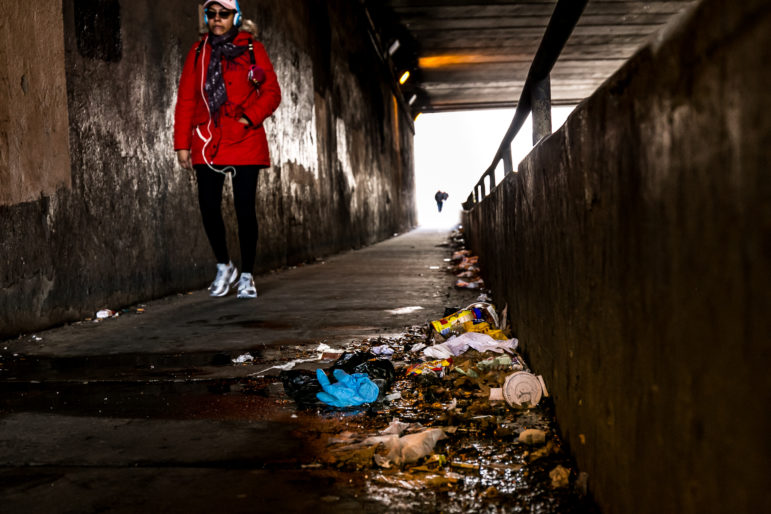Plus, comptroller hopefuls on investing and sex crime, a DA candidate weighs in on cybercrime and calls for a tenant union.

Adi Talwar
Mayoral hopeful Shaun Donovan is proposing a data-driven approach to tackling litter.Yang on Broadway
Mayoral candidate Andrew Yang has been emphasizing the importance of the city’s cultural offerings in its recovery, and last week he again stressed how important Broadway is to that picture. “New York’s recovery is not only administrative or keeping the bureaucracy churning,” he said. “It is about restoring the character of the city, reopening businesses, bringing back commuters and tourists, and ushering in a cultural revival.” His plan to restore the city’s theater sector includes a massive marketing campaign, a benefits fund for freelancers and public safety and quality-of-life improvements in the theater district—including reducing the very visible street homelessness presence there. He also wants to use philanthropic donations to purchase big batches of tickets to Broadway shows and distribute them through nonprofits.
Donovan wants dirty data
Mayoral hopeful Shaun Donovan wants New York City to take a page from Los Angeles, Phoenix and Baltimore and develop a more sophisticated method for mapping and tracking litter hotspots and resident complaints about garbage. Arguing that “the prevalence of trash is a persistent reminder of our current mayor’s shortcomings and failed promises,” Donovan says his CleanStat initiative will give the city the data it needs to find and fix gross conditions. A 2017 investigation by City Limits’ youth journalism program found that there are certainly persistent litter hot-spots around the city. The problem wasn’t that there was no data on the problem—311 already accepts litter complaints—but rather that it was unclear who was responsible for cleaning them.
Stringer sets sights on summer
Primary Day is the second day of summer, but whatever the outcome, Scott Stringer won’t be mayor in time to directly impact city policy for summer 2021. That hasn’t stopped the comptroller from proposing ways to make this a “Comeback Summer,” including free day camps and recreational activities for kids, expanded summer youth employment, grab-and-go meals, restored support for city parks, pop-up pools and more. In what might put a bummer in some kids’ summer (but might answer many parents’ prayers), Stringer is also calling for tutoring for kids who’ve fallen behind thanks to more than a year of largely remote learning.
Garcia plots a greener city
150 million square feet is, well, a lot of square feet—about 3,400 acres and a little more than five square miles—and it’s what Kathryn Garcia’s mayoral campaign is promising to “green” if she becomes mayor. A big chunk of that territory will come from turning Rikers Island from a penal colony to a hub for renewable energy, but Garcia also wants to green every school roof, turn 500 school playgrounds from blacktop to greener surfacing, introduce new green technology on NYCHA property and convert some 3 square miles of curb space around the city into green infrastructure. The ambitious target for public space could prove daunting to meet; the city has struggled to hit its targets for green infrastructure when it comes to stormwater retention.
Lander names responsible-investing advisers
New York City’s five retiree pension funds, which together comprise one of the largest institutional investors in the country, have long embraced some elements of social activism, from opposing apartheid in South Africa to resisting the tobacco industry. The choice of whether to restrict investments is sometimes framed as a narrow one between embracing social values and increasing financial returns, with the latter being an existential duty of the funds. However, advocates for divestment often argue that the two goals are aligned: That it’s both morally right and financially savvy to get out of, say, fossil-fuel stocks. Comptroller candidate Brad Lander says he will embrace that philosophy fully if elected. “Leading economists, investors, and analysts increasingly recognize that highly-diversified funds can manage the risk facing individual companies or sectors, but are still highly exposed to systemic risks facing the economy as a whole,” reads a new white paper from his campaign. “Serving as a fiduciary for these funds must include strong attention to those core systemic risks, including the climate crisis, rampant inequality, and racial injustice.” Lander named members of a group to advise the pension funds on investment strategy, which he says would be updated every two years. One challenge to those efforts: The different funds have not all been on the same page when it comes to divestment strategies.
Iscol opposes full sex-trade decriminalization
Given the financial orientation of the comptroller’s office and the fact that the mayoral race has a higher profile, people running for comptroller face a challenge in attracting voter attention and distinguishing themselves from other candidates. One option is to find ways to link the comptroller’s powers over the pension system or agency audits to particular policy goals. Another is to simply weigh in on important policy issues even if they have no connection to the comptroller’s duties because, after all, it’s a citywide post. Zach Iscol took the latter tack last week, coming out in opposition of a State Senate bill (S6419) that he said would “fully decriminalize pimping, sex buying, and sex work” and “significantly increase the trafficking of vulnerable communities and risks making New York a global center of the sex trade.” He instead supports S6040, which would “decriminalize people in prostitution, mandate access to social services, strengthen laws against sex trafficking, and advance criminal justice reform.” Iscol thus jumped into a passionate debate among people seeking to reform how sex work is treated between those advocating broad decriminalization and those seeking a more modest change to existing law.
Lang throws the book at policy
The crowded race for Manhattan DA has been policy heavy: Most of the candidates have released a slew of fairly detailed policy reports. Lucy Lang has now compiled her plans into a 59-page book. According to her campaign, the Lang book contains prescriptions for racial justice, restorative justice, mental health and substance abuse, gun violence, sex crimes, domestic violence, hate crimes, financial crimes, cybercrimes, tenants’ rights, worker protection, human trafficking, a COVID-19 task force, building community, inclusive workforce, homelessness, LGBTQ+ communities, successful reentry, equal access, prosecutorial ombudsman, prosecution and defense, police accountability, public corruption, retroactive review and conviction integrity, mission-aligned metrics, and legal training. The focus on policy in the DA race reflected the shift in criminal-justice philosophy toward increased racial consciousness and reduced trust of the police or incarceration, an intense competition for progressive primary votes and the need to create buzz without the in-person events that would normally be part of a campaign. Now candidates have to distinguish themselves with 10 weeks until a primary that will be overshadowed by citywide campaigns. Lang’s betting on a book to help her do that.
Quart’s cyber crackdown
Assemblyman Dan Quart, a candidate for Manhattan district attorney, has been less prolific on the policy-proposal front than most of his Democratic primary opponents. His “public safety” plan, released last week, touches fairly lightly on many of the bases that other campaigns have addressed with detailed briefing papers, like gun violence, economic crimes and wage theft. An issue that has received less general attention, and one where Quarts provides more detail, is cybercrimes. Alleging that “cybercriminals have been operating without consequence because of a lack of attention, ability, and resources from law enforcement,” Quart promises new intake efforts to detect a broader span of cybercrimes, reallocating resources to respond to those reports, reaching out to small businesses harmed by such crimes and “creating the nation’s first specialized cyber court.” That court would follow in the footsteps of specialized drug and gun courts.
Hoylman calls for tenants union
The rent relief provisions in the new state budget are likely to reduce the debt that many tenants have accrued during the pandemic and ease the financial pressure on landlords, but it is unlikely to completely or permanently solve the problem of reconciling tenant and landlord needs. State Sen. Brad Hoylman, a candidate for Manhattan borough president, believes that problem is partly one of coordination: Tenants have to negotiate their relationship with a landlord one by one, leading to disparate outcomes for similarly situated tenants, while landlords have to handle negotiations with dozens, hundreds or even thousands of tenant households. The answer, according to Hoylman, is to use the MBP’s office to form tenants unions among the residents of buildings held by the same landlord or holding company and mediate negotiations between those unions and property owners. “It is a sad fact of our housing market that while condominiums and co-ops have boards to address a collective need to reduce maintenance fees or common charges due to hardships caused by the pandemic — rental buildings often do not,” his campaign literature reads. Gaining the necessary critical mass could be difficult: Neither tenants nor landlords would be forced to participate, and not every tenant would be well-served by the outcome of negotiations aimed ostensibly at getting the best deal for most tenants.









